The Family Income and Expenditure Survey (FIES) is a survey on family income and expenditure of households undertaken by the Philippine Statistics Authority (PSA) across the country. It is the main source of data on family income and expenditure in the Philippines. The 2021 FIES is the nineteenth survey conducted from the time it started in 1957.
Based on the recent preliminary results of 2021 FIES, the annual poverty per capita threshold in Misamis Oriental (including Cagayan de Oro City) increased by 17.22% which is Php24,118 in 2018 to Php28,270 in 2021. This increase is higher than year-on-year growth between 2015 to 2018 which is only 9.05% (Figure 1).
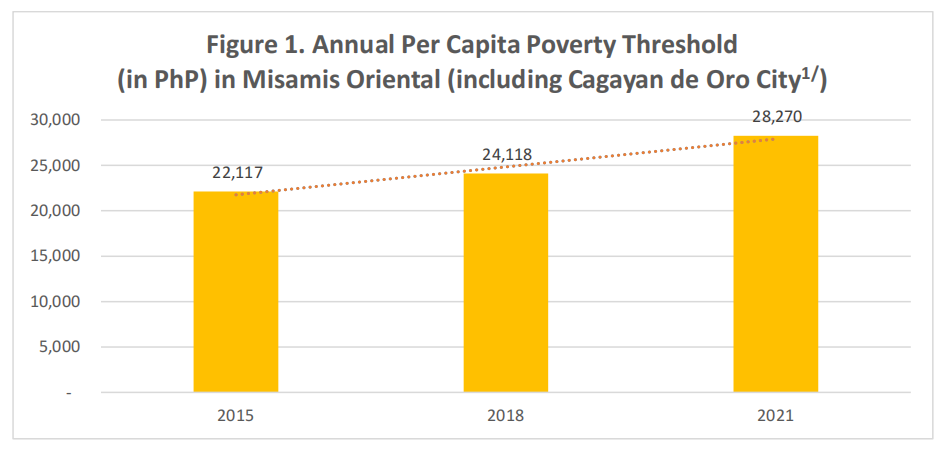
This means that minimum income requirement to meet daily needs has increased since 2015, 2018 and 2021. It only takes Php1,843.08 in 2015 and 2,009.83 in monthly income to meet basic food and non-food requirements, it has reached to 2,355.83 to meet these requirements in 2021 in Misamis Oriental including its Highly Urbanized City (HUC) of Cagayan de Oro.
A Cagayan-anon needs at least Php2,405.83 on average monthly to meet the basic food and non-food requirements in 2021
The annual per capita food threshold in Cagayan de Oro City (excluding Cagayan de Oro City) is Php28,870 based on the preliminary results of the 2021 FIES. This means a Cagay-anon needed at least Php2,405.83 on average monthly to meet the basic food and non-food requirements in 2021 (Table 1). This annual per capita poverty threshold is higher than 18.25% compared to previous year (Figure 2).
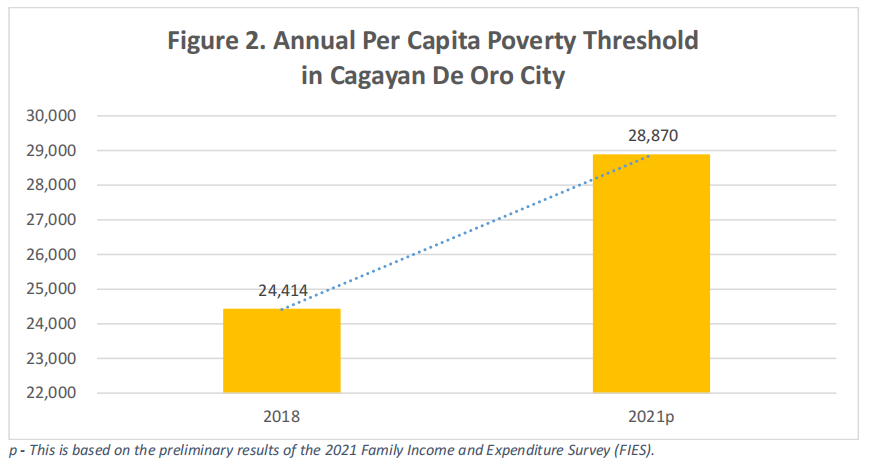
On a lens, there are 6.79% of families in Cagayan de Oro City with income that falls short to meet the daily food and non-food requirements. Poverty incidence among families in the city increased from 6.11% to 6.79% in 2021 (Figure 3 and Table 3). There’s just a slight increase seen in the incidence in the city as well as what is observed in its severity of poverty from 0.285% to 0.298% (Table 3).
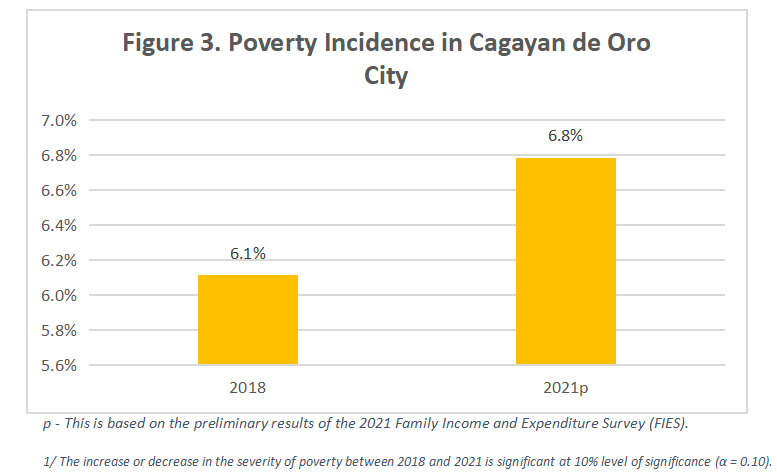
There were about 13.2 thousand families in Cagayan de Oro City that were poor in 2021 and it has increased by about 2 thousand families since 2018. About 79 thousand individuals were classified as poor in 2021 which increased by more than 13 thousand individuals since 2018 (Table 1).

A Cagay-anon needs at least Php1,680.00 on average monthly to meet the basic food needs
The annual per capita food threshold in Cagayan de Oro City (excluding Cagayan de Oro City) is Php20,160 in 2021. This translates to a need of at least Php1,680.00 on average monthly to meet the basic food needs and satisfy the nutritional requirements set by the Food and Nutrition Research Institute (FNRI) to ensure that one remains economically and socially productive (Figure 4 and Table 2).
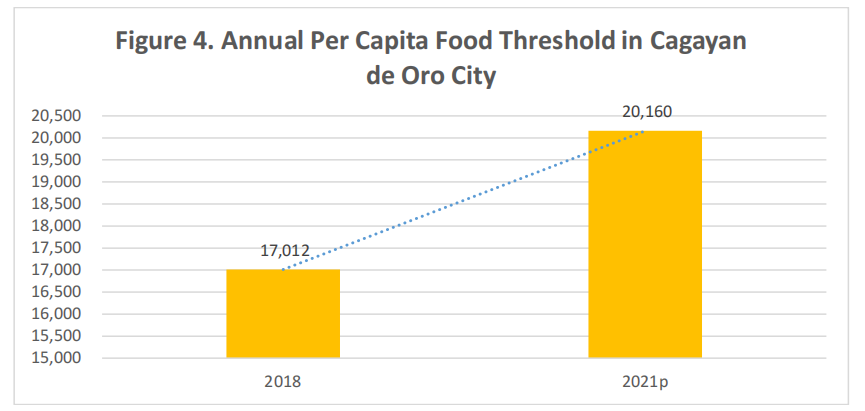
Subsistence incidence in the city increased from 1.07% to 1.21% from 2018 to 2021, this means that this is the proportion of the families in Cagayan de Oro City with income that falls short to meet the daily food needs (Table 3).
About 16 thousand Cagay-anons were considered living below the subsistence level or the magnitude of the poor population in the city who cannot meet the basic food needs in 2021. This can be translated to about 2.4 thousand families living in such conditions below the food threshold, it increased from about 1.9 thousand families in 2018 (Table 2).
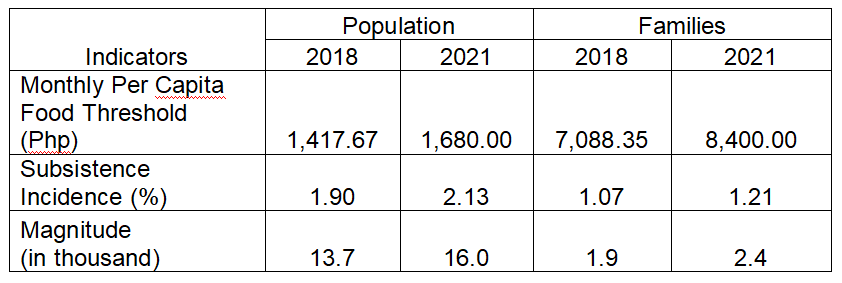
Income and poverty gaps in Cagayan de Oro City increase from 2018 to 2021 as well as the severity of poverty
In addition to the thresholds and incidences, the PSA also releases other poverty-related statistics such as the income gap, poverty gap and severity of poverty (Table 3).
The income gap measures the average income required by the poor to get out of poverty, expressed relatively to the poverty threshold. While the poverty gap refers to the income shortfall (expressed in proportion to the poverty threshold) of families with income below the poverty threshold divided by the total number of families.
The severity of poverty is the total of the squared income shortfall (expressed in proportion to the poverty threshold) of families with income below the poverty threshold, divided by the total number of families. This is a poverty measure that is sensitive to income distribution among the poor.

In 2021, the average income of poor families in Cagayan de Oro City was short by 18.20% of the poverty threshold. This means that in order to move out of poverty, a poor family of five members needed an average additional monthly income of about PhP1,976.95.
Moreover, the poverty gap in the city was estimated at 1.1 percent in 2021. This implies that each family has an income shortfall of one percent of the poverty threshold to eliminate poverty.
Income gap in Cagayan de Oro City has improved by 0.8% from 2018 with 17.7% and 16.9% in 2021. On the other hand, the poverty gap and severity of poverty has worsened a notch in 2021 with an observed increase of 0.1% and 0.01% respectively (Table 3).

